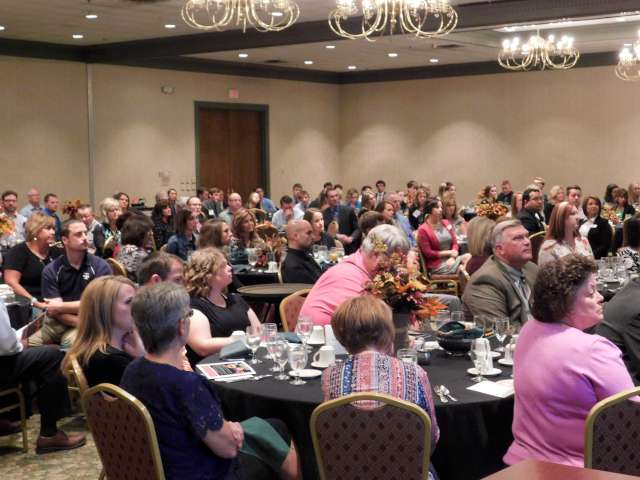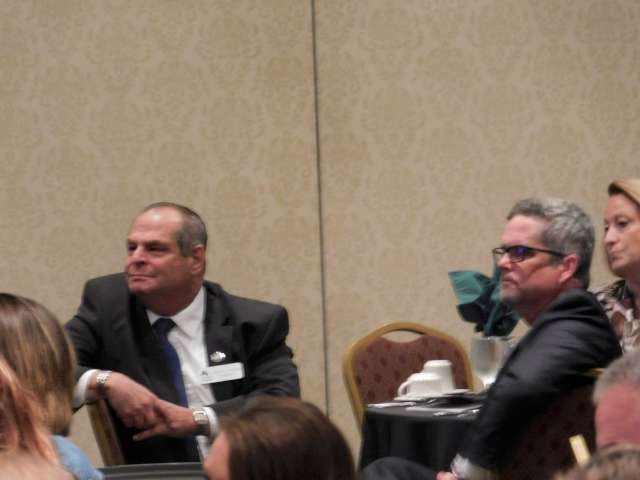
Collaboration and Cooperation Themes Heard at Education Kickoff Breakfast

Published on September 6 2017 10:26 am
Last Updated on September 6 2017 10:47 am
Written by Greg Sapp
Collaboration and cooperation...those are words heard repeatedly in most anything productive that happens in Effingham County.
Those were words heard often during Wednesday's Kickoff to Education Breakfast at Thelma Keller Convention Center. This was the third annual such breakfast, designed to talk about positive things happening in each school district in the county at the beginning of the school year. The Breakfast is sponsored by the Effingham County Chamber of Commerce.
Representatives of Altamont Unit 10, Dieterich Unit 30, Effingham Unit 40 and Teutopolis Unit 50 shared about initiatives in their school districts and representatives of Sacred Heart School focused on their new "virtue-based education" program. Lake Land College President Josh Bullock and Eastern Illinois University President David Glassman also spoke, Bullock noting that September 6 is the date, 50 years ago to the day, that the first students began their first day of classes at Lake Land.
(EASTERN ILLINOIS UNIVERSITY PRESIDENT DAVID GLASSMAN AND LAKE LAND COLLEGE PRESIDENT JOSH BULLOCK)

Teachers from Altamont discussed their Reading Buddy Program that pairs first graders with eighth graders that has grown to more a mentoring time as simply a reading time. They also discussed their Vocational Education program and let two students share their experiences in the program.
Dieterich Superintendent Cary Jackson focused on the initiatives that has helped the Dieterich community grow in various ways and has turned around their enrollment, which had fallen from 600 students to 425 students 10 years ago and has now grown back to more than 500 students. Jackson said the effort focuses on "cooperation among different agencies toward a common goal."
Greg Sapp talked with Cary Jackson about his presentation following the breakfast...
Effingham High School teacher Ryan Ervin reviewed various initiatives being seen throughout the Unit 40 district. Ervin noted that we are closer to 2030 than to 2000, helping to illustrate how the years move by. Ervin said things we are learning and experiencing will help us in the here and now, but reminded that kids are being taught not just for today, but for tomorrow. He said that the past 15-20 years illustrate that the coming 15-20 years will be full of change for us and our children.
Ervin shared that in recent years, Unit 40 has begun to emphasize helping its students prepare to be "global citizens". Critical thinking and problem solving are keys as are 21st Century technological skills, the ability to adapt to circumstances and obstacles, and "cross-cultural awareness".
Ervin shared these examples of what's going on in the district to further the critical thinking and problem solving goals:
- Four Unit 40 teachers participated in the Illinois Mathematics and Science Partnerships Program (Central, EJHS, EHS)
- Unit 40 has been awarded multiple grants to continue a hydroponics program and expand it to four buildings
- Central Grade School is one of the 2017-2018 Blue Stem Grant recipients and will receive $1600 to add to their library selection
- EHS was chosen for the 2017-2018 Abraham Lincoln Readers’ Choice Award Grant Program
- The gradual release of the district’s instruction model is being implemented in all five buildings. For example, guided reading is used at ELC and South Side to meet students where they are as they learn to read and comprehend
- Central, EJHS, EHS offer coding, robotics, and other cutting-edge technology experiences in their buildings
- There are now “makerspaces” (these are areas set aside in libraries or other rooms where students can discover, invent, and understand through “making” and designing
- Unit 40 is a host site for other educators to see how buildings, classrooms, and programs operate. The district began an “Observe Me” initiative this year, where teachers can hang a sign outside their door asking for fellow teachers, administrators and community guests to come in, watch what’s going on, and leave feedback
- And, staff serve as presenters and trainers for Science, Social Studies, Teacher Evaluation, Co-Teaching, Curriculum Building, Therapeutic Crisis Intervention, CPR and AED usage, technology, Teacher Leadership and Teacher Innovation and Creativity. Ervin said it's these last two initiatives, teacher leadership and teacher innovation, that have been the most exciting to watch develop.
Sacred Heart teachers shared that their virtue-based education effort has as its goal "to be more like God" and to be a school "that spreads peace."
Teutopolis Superintendent Bill Fritcher took a different turn in his presentation, focusing on the February bus crash that injured a number of Teutopolis basketball players and cheerleaders as well as some of the adults transporting them to a boys game. Fritcher's list of "what we learned" from the experience includes: have someone drive you to the scene...find out who is in charge...check out the adults' condition so if they're alright, then can assist at the scene...get info on the situation out as soon as possible...keep your message consistent...secure cell phones on a bus, saying "they act like projectiles'...have contact info for all kids on the bus, which Fritcher said is especially important for younger students who might not have a cell phone...do bus evacuation drills, saying his students told him "we knew what to do because we practiced"...don't let windows on the bus be lowered below the allowed line or else some students in a crash might be ejected...stay seated on the bus...and be thankful for caring and professional staff members.
Bullock shared that Lake Land is stronger fiscally than when the financial crisis in Illinois hit, and focused on new and well-received programs including the Medical Assistants program, the Public Safety Telecommunicator program, and the Welding program offered at Effingham High School.
Glassman shared the top marks Eastern receives for retention rates, graduation rates, graduate satisfaction rates, and placement rates within six months of graduation. The university's placement rate of 94%, Glassman said, compares to the national average of 80 to 83%. He also noted that Charleston for the second year in a row was judged the second safest campus community in the nation.













